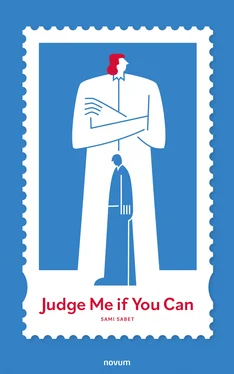They were wearing long white gowns (known in Arabic as a ‘galabeya’) and a scarf on their heads, held in place by what looked like a black rope joined to form a loop. One day, I was able to walk into the clinic without being seen and heard my father talking to his assistant in a room where the door was left ajar. Peeping in, I could see a man lying on a bed, with the assistant holding his legs and my father standing next to his head. In my father’s hands were two small round probes, attached by wires to a machine. Around the patient’s head was a band, under which the probes were positioned on either side of the head. He asked the assistant to hold the man tightly and flicked a switch while rotating a dial, making the needles move. The man’s body and head turned violently, one way, and then the other. I was frightened, thinking that they may not want me to be watching this. So, I ran out before anyone could see me. I kept wondering why the man tossed and turned so violently. Did the probes on his head and in the machine have anything to do with it? Was he suffering? Much later on, I was informed that the man was a patient who was undertaking ‘electric shock treatment.’ Apparently, the electricity going through his brain was supposed to stimulate and return brain impulses to a stable state. That is, his brain is shocked into functioning properly. As I got much older and read more about the subject, I found this to have been, at best, a very simplistic view.
Although its exact mechanism or action is unknown, electroconvulsive therapy (ECT), as it is now known, is believed to treat difficult cases of depression or schizophrenia. It works by inducing seizure activity via electricity in the brain. The treatment lasts for a few minutes, carried out two or three times a week for a few weeks, followed by therapy on an outpatient basis. Although now frowned upon, it seems to have been used as recently as the early 2000s.
A year after moving into the bungalow, my parents decided to distance us from the clinic by relocating to a building, where our private residence occupied the first floor, with its own, separate entrance, leaving the ground floor for the new clinic. We spent three happy and eventful years there.
My parents made many friends, including some members of the Saudi royal family. Father’s Egyptian colleagues were like us, with children of similar ages, and shared a need to feel close to the country they left behind, with its warmth and familiar culture. They would gather at our house, or we would visit them in their homes, and on weekends there would be outings to leisure parks where we would enjoy sumptuous picnics and BBQs.
On one occasion, my father took me to a lunch that he had been invited to by a prominent Saudi. They had prepared a feast at the centre of which was a large round serving dish filled with rice and topped with a whole grilled lamb. The table, with extremely short legs, was placed on the floor in a room which was open to the outside. Plates were placed around the table, as were cushions on which we would sit. Everyone sat around it crossed legged on the floor. However, my father could not do this, so they had to bring more cushions stacked up, enabling him to sit without having to cross his legs. Then came the interesting part! There was no cutlery, and I did not know how I should eat.
They pulled up their sleeves to their elbows, stretched their hands into the dish, grabbed a handful of rice, squashed it into a ball and put it in their mouths. In turn, they proceeded to hold the lamb with one hand while pulling a portion off by the other. They used only their hands to cut, mould and eat the food. It became clear to them that my father and I were not eating. We were not used to eating like this. The host asked the servants to find and bring a knife, fork and spoon for us. After the meal, I was allowed to explore the ornamental courtyard while the men talked and drank Arabic (Turkish) coffee and talked. Eventually we thanked our guest and took our leave. It was my first experience of lunch with company lacking in women, and men eating without utensils. Why exactly did they do this? I could not understand. However, I was informed that the proper way to eat like this was to use one’s thumb and two index fingers to manipulate the food and place into your mouth. More importantly, you should do this using only your right hand.
At home, we had modern furniture, including a normal dining table with long legs, allowing chairs to be placed around, and be pushed, under it. We did not sit on floors. Mum had asked for a second, smaller dining table, with chairs, to be made shorter, especially for me and my brother. It was made to measure for our small sizes and heights, with appropriate chairs. We even had a ‘child size’ water jug, glasses, and cutlery.
There were several gatherings at our house, with friends being invited for lunches or dinners. They were fun, as we got to share our toys with other children. However, my birthdays were very special, when my parents held lavish parties. They included not only the usual feast of food and large birthday cakes, but also a cinema projector displaying the most recent films brought from Egypt. Mum spent days cooking and, with the help of a maid, arranged the seating to segregate men from women. The reason for this was because, in Saudi Arabia, men and women were not allowed to mix at social gatherings or business. If they had to meet, the women must remain covered from head to toe. This included their faces, which were hidden by a black veil, allowing only limited view for the women. To ensure comfort and freedom from such restrictions, they gathered, ate, and drank in different rooms. I used to wonder how the children knew who their mothers were. During the showing of the film, the women sat at the back, behind the men. When only our Egyptian friends were gathered, there was no segregation. Women dressed normally and mixed with men.
The princesses always brought the most sophisticated and expensive toys as presents. These included ones that were operated by batteries, which were very rare in those days. One of my favourites was a vehicle on wheels that responded to the sound of a whistle. When I whistled to it, it moved, whistle again and it stopped. At the same time, they always brought a similar, though more modest, gift for my brother and baby sister. Eventually we had a room full of these toys.
I had asked my father about what made these toys do what they did, and learned that they had magnets within them. One day, my brother and I were bored and decided to investigate. We raided the room, taking each toy in turn and dismantling it so that we may find out how they worked. We had destroyed 70% of these before our mother found us. After a severe telling off, we were banned from playing with the remaining ones for a month. We never managed to rebuild such a collection again.
Before long, it was the start of the school year. I was sent to a private kindergarten, and on the first day my mother accompanied me. There, I saw other children crying, as they had to leave their parents and forced to let go of their hands. I just went in and waved goodbye to my mum. Inside, toys were given to us to play with. Then, at midday, mattresses were laid on the floor and we were asked to lie down. They read us a story and after several minutes we were fast asleep.
Very early the following morning, a bus came to collect me from home. School was the same; play, being read to, and sleep. The school bus was there again after school and travelled around, dropping each pupil at his house. For some reason, I was the last one to be dropped off; by which time it was getting dark. My mother was furious as it was a very long day for me, and I had not been given anything to eat at school. She refused to let me go back again, despite my protests that I enjoyed my visits to the kindergarten. Alas, I was forced to accept what became the first of several, uncalled for and forced disappointments throughout my later life.
Читать дальше












